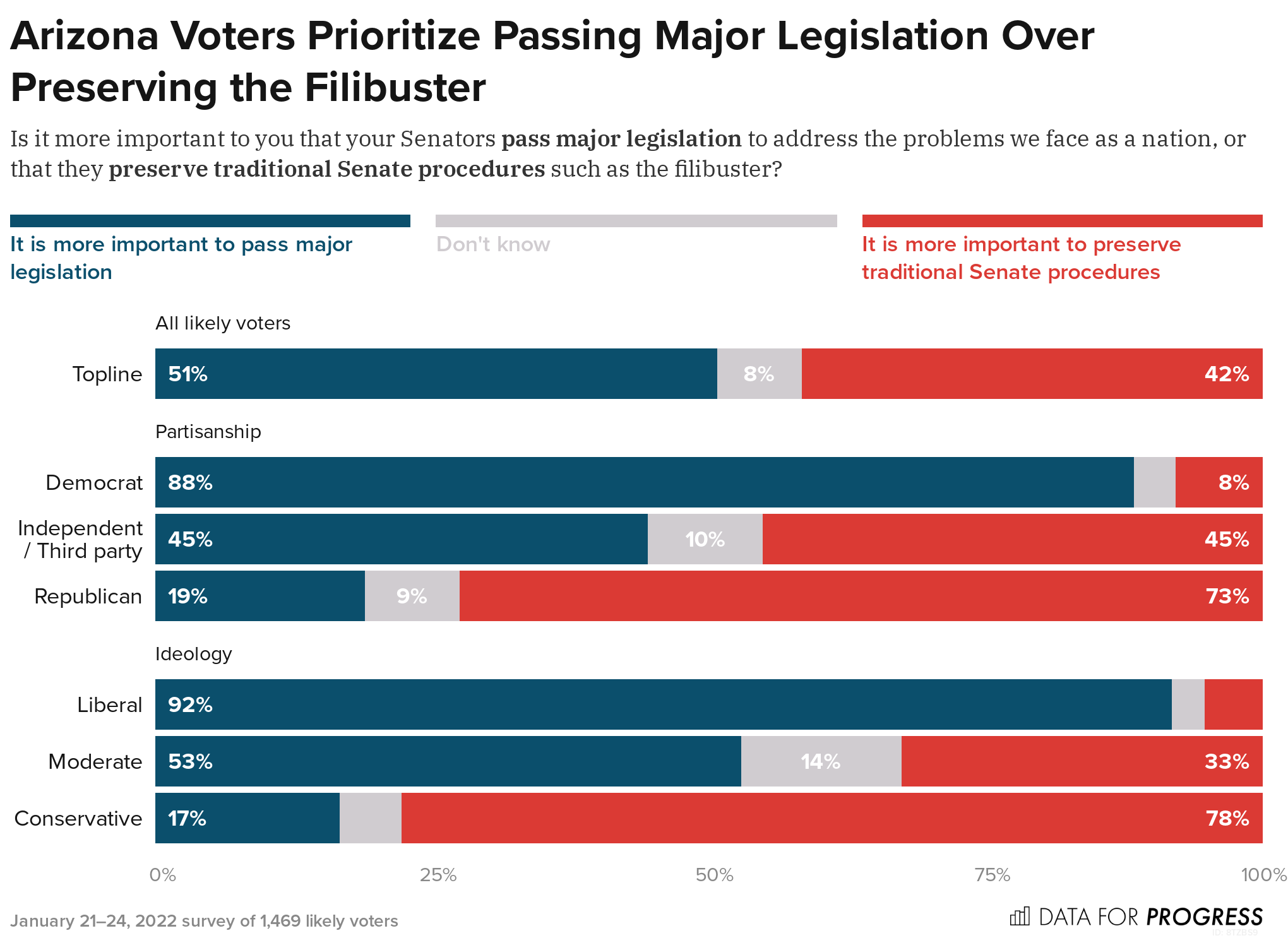Mark Kelly Narrowly Leads in Arizona 2022 General Election Matchup
By Ryan O’Donnell, David Guirgis, and Brian Burton
In recent years, Arizona — a traditional battleground state — has trended blue. Voters elected Democrats Kyrsten Sinema and Mark Kelly to the Senate in upset victories in 2018 and 2020, respectively, and in 2020 the state narrowly voted for Joe Biden. But amid surges in Republican voter enthusiasm and turnout, Arizona is once again poised to become a battleground. Kelly, who won his seat in a special election, is running for his first full term, and a crowded slate of Republicans are hoping to replace him. Incumbent Republican Governor Doug Ducey is term-limited and is thus not eligible to run for re-election in 2022. While he has stated he will not be joining his party’s Senate primary as recently as January 20, 2022, speculation about a possible run has mounted anyway.
New Data for Progress polling gauges the state of the 2022 midterm elections in Arizona, analyzing favorability and approval across different candidates and elected officials as well as the issues Arizona voters support.
Democrats Hold Slight Edge Across Favorability and Job Approval
Likely voters across Arizona hold unfavorable views of both President Biden and former President Donald Trump, but Trump lags 4 points behind Biden’s -9 points net favorability. Similarly, while voters largely hold negative views of both Ducey and their Democratic senators, Kelly holds only -3 points net favorability to Ducey’s -18 points. In fact, Kelly has the highest favorability among himself, Ducey, Biden, and Sinema; Sinema holds -10 points net favorability.
Among the Republican Senate candidates officially jockeying for the nomination are Arizona Attorney General Mark Brnovich, venture capitalist Blake Masters, energy executive Jim Lamon, and retired Air Force Maj. Gen. Mick McGuire. All four candidates suffer from low name recognition. Sixty-four percent of voters don’t know enough about Lamon, who broke into the national spotlight for using the anti-Biden catchphrase “Let’s go, Brandon” in a campaign ad; meanwhile, Masters lags 4 points behind him, and over 80 percent of voters haven’t heard enough about McGuire. Forty-two percent of voters haven’t heard enough about Brnovich, a statewide elected official.
Both Lamon and Brnovich carry lower net favorability than Kelly, and Masters and McGuire fall within the margin of error. However, because their name recognition is so low, each candidate faces an uphill battle to make themselves known to voters and close their favorability margins.
Mark Kelly Leads in Head-to-Head Matchups Against Republicans; Ducey Is Vulnerable
In head-to-head matchups, Kelly leads against both Ducey and Brnovich. Kelly leads 49-47 against Brnovich, who suffers from much lower name recognition than Ducey; meanwhile, Kelly leads 50-47 against Ducey.
When messaging is introduced surrounding Ducey’s coronavirus response and the fact that his office is under federal investigation for corruption and financial mismanagement, Ducey’s favorability and job approval plunge to -30 points and -19 points, respectively.
Arizonans Want Their Senators to Enact the Biden Agenda, Tax the Rich to Do So
In the wake of the Freedom to Vote: John Lewis Act’s failure to pass through the Senate — mainly because of Sinema’s refusal to end the filibuster — Arizona voters have made clear that they want their senators to pass major legislation, even if it means ending the filibuster. When asked if it was more important to voters that their senators pass major legislation to address the problems we face as a nation, or that they preserve traditional Senate procedures such as the filibuster, passing major legislation carried a +9-point margin with likely voters.
The Freedom to Vote: John Lewis Act is popular with Arizona general election voters. By a +24-point margin, including a +9-point margin of self-identified Independents and a +35-point margin of self-identified moderates, voters want that bill passed.
In addition, Arizona voters want the key provisions of the Build Back Better Act, which Sinema has also obstructed, passed. Eighty-seven percent of voters support allowing Medicare to negotiate prescription drug costs, a policy that is widely popular across the political spectrum. Similarly, the pay-fors for the Build Back Better Act — which amount to raising taxes on the ultra-wealthy and corporations — prove popular with Arizona voters. Sixty-two percent of voters support increasing funding for the IRS to make sure the wealthiest Americans pay the taxes they owe, and 64 percent of Arizona voters support raising taxes on the wealthiest 2 percent of Americans. In addition, 68 percent of Arizonans support a minimum 15 percent tax on large corporations that earn over $1 billion in profit, while 62 percent of voters support increasing taxes on people who earn over $1 million a year from selling stocks and bonds.
Takeaways
In Arizona, Democrats currently hold a slight advantage leading into the 2022 midterm elections. Kelly is the most popular Democratic statewide elected official, outpacing the favorability of President Biden and Sinema. Unlike her, Kelly’s voting record aligns with the issues Arizona voters want their senators to undertake — and against a crowded field of Republicans, including the potential for Ducey to enter the race, he leads with voters.
Ryan O’Donnell (@ryanodonnellpa) is the Electoral Director at Data for Progress.
David Guirgis is a writing fellow at Data for Progress.
Brian Burton (@Brian_C_Burton) is a Senior Analyst at Data for Progress.
Methodology
From January 21 to 24, 2022, Data for Progress conducted a survey of 1,469 likely voters in Arizona using SMS and web panel respondents. The sample was weighted to be representative of likely voters by age, gender, education, race, and voting history. The survey was conducted in English. The margin of error is ±3 percentage points.








